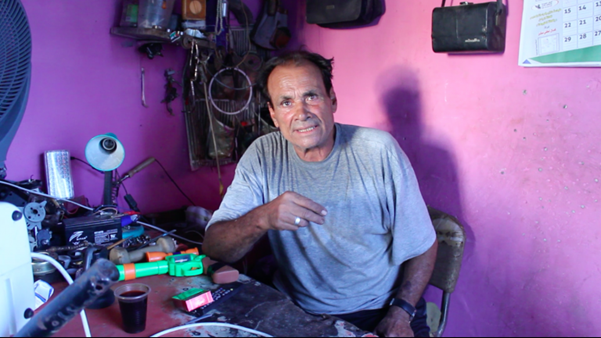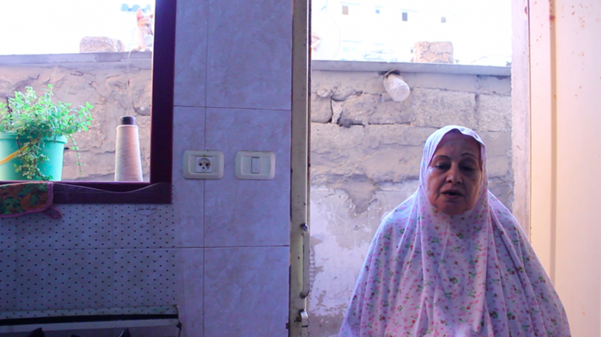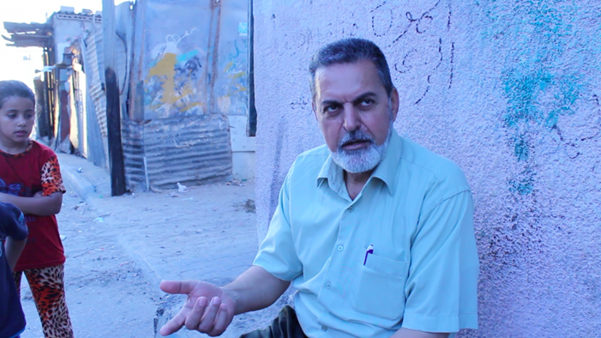www.aljazeerah.info
News, August 2016
Archives
Mission & Name
Conflict Terminology
Editorials
Gaza Holocaust
Gulf War
Isdood
Islam
News
News Photos
Opinion Editorials
US Foreign Policy (Dr. El-Najjar's Articles)
www.aljazeerah.info
|
Editorial Note: The following news reports are summaries from original sources. They may also include corrections of Arabic names and political terminology. Comments are in parentheses. |
Israeli Blockade of Gaza Strip Causing an End to Fresh Water Resources
August 7, 2016
International Solidarity Movement | Gaza Team

07 Aug
As every year, during the summer, the water shortage in the Gaza Strip
is accentuated. At the same time, the energy shortage caused by the
blockade prevents engines and water pumps from pushing it from wells and
tanks to houses and farming fields.
The Beach Camp is one of the more densely populated areas of Gaza and
therefore one of the most affected by water scarcity. In addition,
because of its location, directly on the seafront, its aquifers are some
of the most affected by the infiltration of seawater and wastewater.
ISM collected several testimonies of people affected by this problem in
order to discuss them with engineer Monther Shoblak, General Director of
the Palestinian National Authority Coastal Municipalities Water Utility
(CMWU).
The first testimony is that of Azzam Miflah El Sheikh Khalil, who says
“the water comes only once every three days, and just for a few hours,
which is not enough
[to fill the tanks]. People can’t imagine how we are suffering
because of the lack of water. In addition, there is no difference
between the water from our wells and the sea water… The main problem is
that when there is electricity there’s no running water and when there
is running water there’s no electricity . The only solution we have is
to buy a generator to produce electricity when there’s water, but who
can buy it if there is no work?”

Azzam El Sheikh Khalil
In the next block lives the Mokhtar Kamal Abu Riela, who stressed the
same problem: “When there’s water there’s no electricity, and vice
versa. Maybe once every four or five days we have water and electricity
at the same time for a few hours. Every day we buy gasoline to run the
generator the hours when there’s running water, but the economic
situation of the people is very precarious and not everyone can spend 20
NIS a day on gas just to have water in the tanks. We spend more on
gasoline than in electricity or water itself”.
We asked the
Mokhtar if he remembers when that problem began: “Ten years ago or
so, with the blockade”.
Finally, Im Majed Miqdad explained the difficulties she and her large
family are faced with in their day to day life due to water scarcity: “There
[are] people who build underground tanks
[as those can be filled without bombs] or who buy a generator
operated with gasoline. But not everyone can afford these things. I’m
one of those people who can not pay NIS 20-30 a day in gasoline to run
the generator. Today, for example, in my home and in the homes of my
four sons and their families we don’t have a drop of water, the four
tanks are empty. We are waiting until running water and electricity will
coincide in order to fill them. The situation is very hard, we have no
water, we have no electricity, we have no work … If water and
electricity would coincide at least three hours a day it would be enough
to fill the tanks enough to spend the day. People must understand that
when there is no water you can not use the bathroom, you can not take a
shower, you can not clean the dishes, the house, the clothes … And here
the families have five, six, ten members … we are not just two or three
people in each house”.

Im Majed Miqdad, who is often left without water supply
Given the frequent complaints of the population, the first thing that
engineer Monther Shoblak wants to explain is that the failures in the
water supply are due to the power cuts and therefore they can’t control
them: “It is impossible for us to match the running water with the
electricity, as to carry water from one area to the other, motors and
pumps are needed and those can’t operate without electricity. We can’t
control it because we don’t know which bomb will fail and when”.

Mokhtar Kamal Abu Riela
However, he explains, the water problem in the Gaza Strip is more
serious than that: “Indeed there is an over-exploitation of the
aquifer in the Gaza Strip. This is because the coastal aquifer, which
runs from Sinai to Yaffa and that is the only source of water available
today in the Gaza Strip, has been nurtured historically by rainwater and
by the water from the mountains of Al Khalil (Hebron) and the Naqab.
However, for decades our neighbors [the Zionists] have been
building dams that prevent the water from following its natural course
to Gaza, leaving rainwater as the sole source of the coastal aquifer.
These dams are illegal, since they involve a violation of the
conventional agreements on transboundary water sources. “
Because of these illegal policies practiced by the Zionist entity, “the
production capacity of Gaza’s aquifer has dropped to 55 million cubic
meters a year. While the water demand of the Strip is 200 million cubic
meters a year”.
This overexploitation is decreasing, to an alarming point, the level of
the aquifer, causing seawater to seep and fill that vacuum, mixing with
the fresh water and contaminating the aquifer. Additionally, to this
chloride contamination caused by seawater seeping into the aquifer, the
water is contaminated by nitrates from leaking sewage and fertilizers: “These
are more dangerous than chlorides, as they can’t be detected by smell or
taste”.
The successive attacks on the Gaza Strip have severely affected the
sewage systems and destroyed thousands of septic tanks, causing in many
cases wastewater to end up in the aquifer.
In addition, due to the lack of resources of local authorities, only 72%
of Gaza is equipped with sewage systems. The rest depends on septic
tanks built without supervision: “The
occupation never provided the necessary services, such as mandated by
international law. They didn’t build enough plants for wastewater
treatment in order to protect the environment. If we look at the
objective data it seems that their intention was just the opposite.
These plants shouldn’t be built in sandy areas, to avoid leaks, and
should have an exit to the sea to prevent overflow in case of emergency.
However, they built the main one in Beit Lahia, the sandiest area in
Gaza and without exit to the sea. So when there is an overflow, which is
quite common, wastewater inevitably ends up in the aquifer and
contaminating farmlands in the area”.
At the same time, several cases of viral meningitis arose all along the
Gaza Strip, some of which were mortal. This seems to be caused by
wastewater contamination. This situation has forced the local
authorities to close many swimming pools and advice the people not to
swim in the sea, during the next weeks.
At ISM official: “Then
the missiles started” – Destruction of Three-Storey Building in Surif
Leaves Three Families Without a Home
***
Share this article with your facebook friendsFair Use Notice
This site contains copyrighted material the
use of which has not always been specifically authorized by the copyright
owner. We are making such material available in our efforts to advance
understanding of environmental, political, human rights, economic,
democracy, scientific, and social justice issues, etc. We believe this
constitutes a 'fair use' of any such copyrighted material as provided for
in section 107 of the US Copyright Law. In accordance with Title 17 U.S.C.
Section 107, the material on this site is
distributed without profit to those
who have expressed a prior interest in receiving the included information
for research and educational purposes. For more information go to: http://www.law.cornell.edu/uscode/17/107.shtml.
If you wish to use copyrighted material from this site for purposes of
your own that go beyond 'fair use', you must obtain permission from the
copyright owner.
|
|
|
|
||
|
||||||


